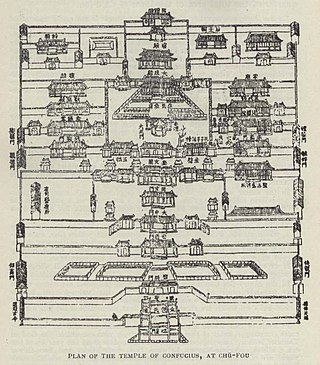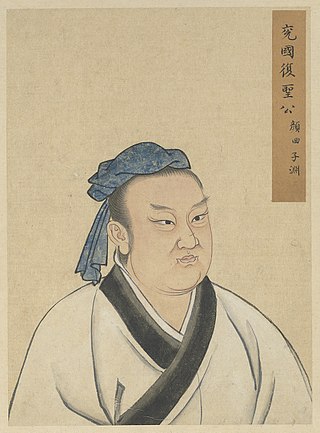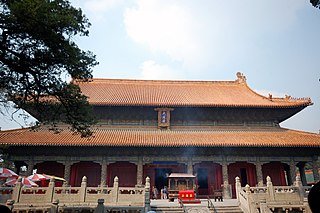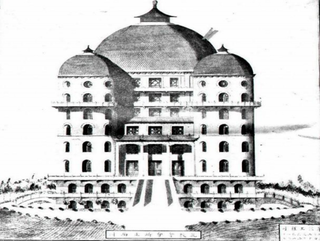
Confucius, born Kong Qiu was a Chinese philosopher of the Spring and Autumn period who is traditionally considered the paragon of Chinese sages. Confucius's teachings and philosophy underpin East Asian culture and society, and remain influential across China and East Asia to this day. His philosophical teachings, called Confucianism, emphasized personal and governmental morality, correctness of social relationships, justice, kindness, and sincerity, as well as an emphasis on a ruler's duty to their subjects.

Qufu is a city in southwestern Shandong province, East China. It is located about 130 kilometres (81 mi) south of the provincial capital Jinan and 45 km (28 mi) northeast of the prefectural seat at Jining. Qufu has an area of 815 square kilometers, and a total population of 653,000 inhabitants, of which, 188,000 live in urban areas.

Quzhou is a prefecture-level city in western Zhejiang province, People's Republic of China. Sitting on the upper course of the Qiantang River, it borders Hangzhou to the north, Jinhua to the east, Lishui to the southeast, and the provinces of Fujian, Jiangxi and Anhui to the south, southwest and northwest respectively. Its population was 2,276,184 inhabitants as of the 2020 census of whom 902,767 lived in the built-up area made of Qujiang and Kecheng urban Districts. Chinese actress and singer Zhou Xun was born in Quzhou.

Kung Te-cheng was a 77th generation descendant of Confucius in the main line of descent. He was the final person to be appointed Duke Yansheng and the first Sacrificial Official to Confucius. He helped formulate and was in charge of officiating the modern Confucius ceremony held annually in the Republic of China (Taiwan). In addition to Ceremonial Official, he held numerous posts in the Republic of China government, including member of the National Assembly from 1946 to 1991, President of the Examination Yuan from 1984 to 1993, and senior advisor to the President of the Republic of China from 1948 to 2000. He held professorships at National Taiwan University, Fu Jen Catholic University, and Soochow University.

A temple of Confucius or Confucian temple is a temple for the veneration of Confucius and the sages and philosophers of Confucianism in Chinese folk religion and other East Asian religions. They were formerly the site of the administration of the imperial examination in China, Korea, Japan and Vietnam and often housed schools and other studying facilities.

The Duke Yansheng, literally "Honorable Overflowing with Wisdom", sometimes translated as Holy Duke of Yen, was a Chinese title of nobility. It was originally created as a marquis title in the Western Han dynasty for a direct descendant of Confucius.

Zoucheng is a county-level city in the south of Shandong province, China. Before it became a city, it was known as Zou County or Zouxian.
Kong is a Chinese and Korean surname. It can also be written as Kung in Taiwan, Hung in Hong Kong, Khổng in Vietnam, and Gong in Korea. There are around 2.1 million people with this surname in China in 2002, representing 0.23% of the population. In 2018, it was the 97th-most common surname in China. It is the 25th name in the Hundred Family Surnames poem.

Mount Ni is a hill about 30 km (19 mi) to the southeast of the city of Qufu in Shandong Province, China. The hill is culturally significant because it is traditionally regarded as the birthplace of Confucius. It is also the site of a historical temple dedicated to Shuliang He, the father of Confucius, a Confucian academy, and the Yusheng Memorial Temple. In 2016, a statue of Confucius was completed on the Mount. Standing at 72 meters, it is the tallest statue of Confucius in the world.
This is a family tree of the main line of descent of Confucius.

Yan Hui was a Chinese philosopher. He was the favorite disciple of Confucius and one of the most revered figures of Confucianism. He is venerated in Confucian temples as one of the Four Sages.

The Temple of Yan Hui, commonly known as simply the Temple of Yan or Yan Temple, is a temple in Qufu, China, dedicated to Yan Hui, the favorite disciple of Confucius.

The Temple of Confucius in Qufu, Shandong Province, is the largest and most renowned temple of Confucius in East Asia.

The Cemetery of Confucius is a cemetery of the Kong clan in Confucius' hometown Qufu in Shandong province. Confucius himself and some of his disciples are buried there, as well as many thousands of his descendants.
Confucius’ Birthday, falls on the 27th day of the eighth lunar month of the Chinese calendar. It is officially celebrated on Taiwan as "Teachers' Day" on September 28, and in Hong Kong on the third Sunday of September as "Confucius Day", though the traditional date is also often observed. Mainland China observes a "Teachers' Day" on September 10 to celebrate the efforts of today's teachers, and there is a legislative effort underway to move that to September 28.
The Four Sages, Assessors, or Correlates, are four eminent Chinese philosophers in the Confucian tradition. They are traditionally accorded a kind of sainthood and their spirit tablets are prominently placed in Confucian temples, two upon the east and two upon the west side of the Hall of the Great Completion.

The Kong Family Mansion was the historical residence of the direct descendants of Confucius in the City of Qufu, the hometown of Confucius in Shandong Province, China. The extant structures mainly date from the Ming and Qing dynasties. From the mansion, the family tended to the Confucian sites in Qufu and also governed the largest private rural estate in China. The Kong family was in charge of conducting elaborate religious ceremonies on occasions such as plantings, harvests, honoring the dead, and birthdays. Today, the mansion is a museum and part of the UNESCO World Heritage Site "Temple and Cemetery of Confucius and the Kong Family Mansion in Qufu".

The Confucian church is a Confucian religious and social institution of the congregational type. It was first proposed by Kang Youwei (1858–1927) near the end of the 19th century, as a state religion of Qing China following a European model.
The Gokbu Gong clan is one of the Korean clans originally from China. Their Bon-gwan are in Qufu, Shandong in China, which was also Confucius's birthplace. Qufu is known as Gokbu (Korean: 곡부) in Korean. According to the South Korean 2000 census, the number of individuals identifying with the Gokbu Gong clan was 74,135. The apical ancestor of the clan was Confucius.
Kong Zongyuan was a 46th generation descendant of Confucius and the first Duke Yansheng.




















